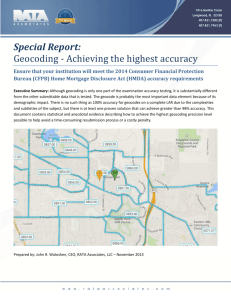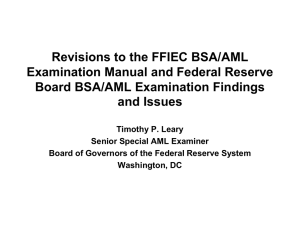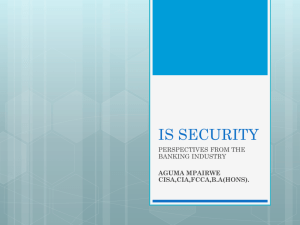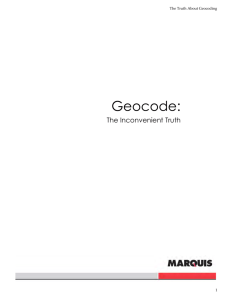Financial Services Update
advertisement
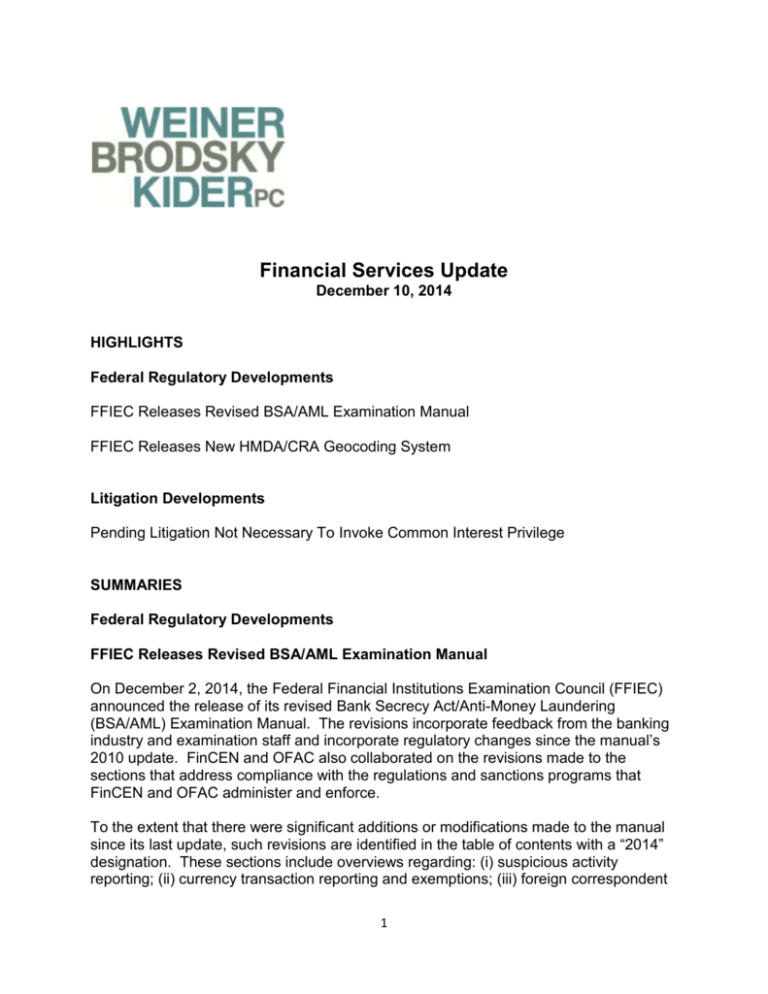
Financial Services Update December 10, 2014 HIGHLIGHTS Federal Regulatory Developments FFIEC Releases Revised BSA/AML Examination Manual FFIEC Releases New HMDA/CRA Geocoding System Litigation Developments Pending Litigation Not Necessary To Invoke Common Interest Privilege SUMMARIES Federal Regulatory Developments FFIEC Releases Revised BSA/AML Examination Manual On December 2, 2014, the Federal Financial Institutions Examination Council (FFIEC) announced the release of its revised Bank Secrecy Act/Anti-Money Laundering (BSA/AML) Examination Manual. The revisions incorporate feedback from the banking industry and examination staff and incorporate regulatory changes since the manual’s 2010 update. FinCEN and OFAC also collaborated on the revisions made to the sections that address compliance with the regulations and sanctions programs that FinCEN and OFAC administer and enforce. To the extent that there were significant additions or modifications made to the manual since its last update, such revisions are identified in the table of contents with a “2014” designation. These sections include overviews regarding: (i) suspicious activity reporting; (ii) currency transaction reporting and exemptions; (iii) foreign correspondent 1 account recordkeeping, reporting, and due diligence; (iv) foreign bank and financial accounts reporting; (v) international transportation of currency or monetary instruments reporting; (vi) OFAC; (vii) foreign correspondent accounts; (viii) bulk shipments of currency; (ix) automated clearing house transactions; (x) prepaid access; (xi) third-party payment processors; and (xii) nonbank financial institutions. Updates also were made to several appendices in the manual. The FFIEC’s Examination Manual provides valuable guidance regarding compliance with BSA/AML rules generally. The revised manual is available on the FFIEC BSA/AML InfoBase at: http://www.ffiec.gov/bsa_aml_infobase/default.htm. The related FFIEC press release can be found at: http://www.ffiec.gov/press/pr120214.htm. FFIEC Releases New HMDA/CRA Geocoding System On December 1, 2014, the Federal Financial Institutions Examination Council (FFIEC) released a new version of the HMDA and CRA Geocoding System that provides enhanced mapping features and more precise geocoding information. The FFIEC Geocoding/Mapping system helps financial institutions identify and collect certain information required to be reported under HMDA. Geocoding information includes the metropolitan statistical area (MSA) or metropolitan division (MD), state, county, and census tract information for the property. Geocoding information generally must be collected and reported for mortgage loans subject to HMDA reporting. The Geocoding/Mapping system allows entities to enter a street address to determine the corresponding geocoding information. The system also provides demographic information about a particular census tract, including income, population, and housing data. The FFIEC HMDA and CRA Geocoding System can be found at: https://geomap.ffiec.gov/FFIECGeocMap/GeocodeMap1.aspx. Litigation Developments Pending Litigation Not Necessary To Invoke Common Interest Privilege A New York appeals court recently held that pending or reasonably anticipated litigation is not required to protect third party communications under the common-interest privilege. The common interest privilege is an exception to the general rule that the presence of a third party destroys the confidentiality of an attorney-client communication. The common interest privilege protects communications shared among parties with “nearly identical legal interest,” but historically in New York and some other states, this privilege only applied when the communications are made under the specter of “pending or reasonably anticipated litigation.” 2 In Ambac Assurance Corp. v. Countrywide Home Loans, Inc., Ambac filed a motion to compel production of communications made in 2008 about the merger of subsidiaries of Bank of America Corporation (“BAC”) and Countrywide Financial Corporation. Ambac asserted that these communications were relevant to its claims for being fraudulently induced into insuring certain residential mortgage backed securities. In June 2013, the referee supervising discovery granted Ambac's motion to compel BAC to produce the 2008 merger communications, concluding that “the common interest rule . . . does not apply unless the parties share a common legal interest that impacts potential litigation involving all parties . . .[T]o hold otherwise would be inconsistent with the narrow scope of the attorney-client privilege.” In a well-reasoned opinion, a five judge panel for the intermediate New York Supreme Court Appellate Division departed from New York’s historically narrow interpretation of the common interest privilege, which required the presence or threat of litigation. The appellate court explained: “[in] today's business environment, pending or reasonably anticipated litigation is not a necessary element of the common-interest privilege. . . [because] business entities often have important legal interests to protect even without the looming specter of litigation.” The Ambac court relied heavily on the public policy underlying the attorney-client privilege, the purpose of which is to encourage “full and frank communication between attorneys and their clients and thereby promote broader public interests in the observance of law and administration of justice.” (citing Upjohn Co. v United States). The court explained that the “pending litigation” requirement developed from cases addressing criminal law, and that continuing the requirement in the civil context would make “make poor legal as well as poor business policy.” According to the panel, entities with a shared legal interest, like the parties in merger discussions, should not be discouraged from sharing legal advice from counsel in order to navigate the complex legal and regulatory process involved in completing business transactions. Although the opinion is limited to the jurisdiction of the First Judicial Department of New York, it is notable for its measured analysis and pragmatic treatment of the common interest privilege in the corporate transactional context. Other New York courts should find the opinion persuasive. Weiner Brodsky Kider regularly represents mortgage lenders and servicers throughout the United States, for matters involving claims for alleged violations of federal and state laws. This Financial Services Update is for general information purposes only and is not in any way intended, nor shall it be construed, as legal advice, legal opinion or any other advice on any specific facts or circumstances. No person or entity (“Person”) should act or refrain from acting upon this information without seeking professional advice. No Person may rely on this information or its applicability to any specific circumstances. The information in this Financial Services Update is in no instance to be taken as an indication of completeness, applicability to a particular situation, or an indication of future developments or results. 3
